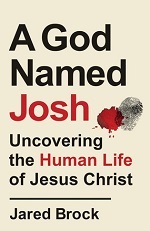About the Book:
The Life of Jesus Like You've Never Imagined
Jesus asked His disciples, "Who do you say I am?" It's a question that still needs an answer today. With deft, insightful, and humorous strokes, award-winning biographer Jared Brock weaves archaeology, philosophy, history, and theology to create a portrait of Jesus we've never seen before.
This is a groundbreaking biography about the historical Jesus we don't usually think about: The child refugee. The "carpenter" who most likely worked with stone. The adult who walked at least 21,525 miles in His lifetime and yet never tasted tomatoes or potatoes. The itinerant rabbi whose real name wasn't Jesus. The political revolutionary whose brutal murder was secretly masterminded by a power-hungry mafia family.
More than a fascinating biography, A God Named Josh seeks to illuminate Jesus of Nazareth from new perspectives, grounded in history, that will surprise Christians and atheists alike.
You can read an excerpt here. You can watch the book trailer here.
My Review:
This book is undoubtedly the most fascinating one I have ever read on the person and work of Jesus. Brock's writing style is wonderful and the book is very readable, even with a bit of humor here and there. I like how he gives possibilities and differing views and how he blends in historical information from other sources. He includes new insights I have never seen before and touches on just enough Greek to be interesting, such as puns. He explores Jesus' family structure and the character of each of his disciples. He also has a wealth of information on the political and cultural conditions of the day. He even reviews descriptions of people of that day to give hints of what Jesus might have looked like. He does the same for how Jesus might have dressed and what he might have eaten.
Perhaps the most fascinating aspect of this book is Brock's clarification of misunderstandings, of ideas Christians have been taught or assumed. An example is the function and composition of the Sanhedrin of that time. At the time of Jesus it was more of an ad hoc advisory group for the high priest, not the more organized Great Sanhedrin of centuries later. He explains many confusing issues, such as why there are two high priests named in Luke 3:1-2.
Old and new believers alike will find much thought provoking information and eye opening insights in this book. It would be a good book to use in a class or small group. I recommend it.
My rating: 4/5 stars.
About the Author:
Jared Brock (www.jaredbrock.com) is an award-winning author and director of several films including PBS's acclaimed Redeeming Uncle Tom with Danny Glover. His writing has appeared in Christianity Today, The Guardian, Smithsonian, USA Today, Huffington Post, Relevant, and TIME. He has traveled to more than forty countries, including North Korea, Transnistria, and the Vatican. Photo Credit: © Steward Communications
Bethany House Publishers, 336 pages.
(My star ratings: 5-I love it, 4-I like it, 3-It's OK, 2-I don't like it, 1-I hate it.)
































